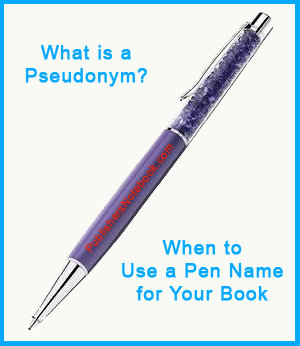What is a Pseudonym and How to Use Them Properly
So, what is a pseudonym, anyway? It is the opposite of an "orthonym" which is one's original or true name. Authors use them all of the time to hide their true identity or to fit the theme of a book.
In a nut shell, a pseudonym is a fictitious name used in place of the actual author's name. It is also known as a pen name, nickname, entity, or an alias. When an author uses a fake or made-up name to author a story, they are using a pseudonym in place of their own legal name.
If you plan on using a pseudonym as your name for a novel or story you've written, you will find it is just as easy as using your own name. But when it comes to book writing and making money, you need to know the complete answer to the question, "What is a pseudonym" before you make that choice of by-lines for your novel. Know everything about "pen names" before you actually decide to use one.
What is a Pseudonym?
A pseudonym has its benefits and downfalls, but just be aware that you will have more work ahead of you if you use a pen name for your writing. It is something you don't want to take lightly or not research before you do it.
Here are some examples of people who have successfully used pseudonyms or pen names with their writing:
Samuel Clemens who wrote under the pen name Mark Twain, Stephen King who wrote under the pen name Richard Bachman, J. K. Rowling who was really Joanne Rowling (no middle name), and Mary Ann Evans who is better known as George Eliot.
What is a pseudonym was a question I juggled around in my mind a lot when I was a young writer. Every time I thought about it, from a money aspect, it all came back to branding.
If you have a brand (something that people know and can remember - like your name if you are an author), it's best to stick to that. But, it gets tricky when you start writing books way outside of your normal topics of interest. For instance, I write books about writing, but I also write books about finance, the stock market, online marketing, and success/motivation for non-fiction and also write fiction novels.
This is dangerous because I am extending out in too many directions, crushing my credibility as an expert in a single area of interest. Now, if I publish a romance book which would be totally off style for my writing and definitely not in any of my areas of knowledge, it would probably not sell very good. But if I wrote it as Sabrina Star, the book would probably sell like wildfire.
What is a Pseudonym and Why Do Authors Use Them!
I've personally seen many authors writing under a pseudonym just because they are embarrassed and didn't want their friends and family to know they write. Some did it because of the subject material they were writing about.
There are many reasons why authors choose to write under a pseudonym. What is a pseudonym? Let's explore more what they are, why authors use them, and see some of the pros and cons of using a pseudonym in these situations.
1. Embarrassment! You may feel uneasy or embarrassed of your writing ability or your work and you don't want people to know you wrote it. Or maybe the topic you are writing about is not something to send home to mamma.
2. Lack of Confidence! Confidence is a huge hurdle in writing. If you lack confidence, maybe because you are new to writing and don't know how readers are going to respond to your work, you use a fake name to mentally protect yourself while still getting your writing out there.
3. Ghostwriting! If you are ghostwriting a story for someone, you rarely, if ever, take credit for that work and may use a pen name to hide your true identity to protect your own work, especially if you are a big named author and your name may be used to add marketing value to a piece. Using a pseudonym prevents other authors from taking advantage of your name for marketing pull.
4. To Disguise the Author's Gender! As part of a marketing move, some publishers require female authors to use their initials instead of their spelled out names to attract more male readers. An example of this is Joanne Rowling who authored the Harry Potter series using a pseudonym of J. K. Rowling. The publisher anticipated a target audience of mostly young boys who might not want to read a book written by a woman. She didn't have a middle name, so she chose "K".
5. Privacy! Most authors who choose to use a pseudonym are trying to hide their identity for privacy. They are afraid their work is going to attract too much attention and possibly put their family in harms way.
6. Joint Interest! Some people who work for an editing, publishing, or writing firm don't want their author's using their real names outside the business for any published work as this may reflect undesirably on the company.
7. Self-Incrimination! Some people who write have committed a crime or may have done something that they don't want people to know about. Most writers write about some kind of personal experience, even in fiction, so they write their stories under a pseudonym so people can't put two and two together.
8. Easy to Remember! A big marketing reason to use a pseudonym would be so readers can easily remember your name. If you have a huge name that is difficult to pronounce, it may be wise to shorten it a little or to use a pen name to make it easy to say and word of mouth to others.
Legal Considerations About Pseudonyms
With the question, what is a pseudonym, there are many situations when using a pseudonym is very useful to the author. But there are some legal things to consider when you are using a pseudonym and starting your own book selling business that many writers don't think about when they are first starting out and want to use an author pen name.
Did you know that in the United States, you must register your fictitious or doing business as (dba) name with your state and is the legal way you can earn money under another name? I recommend if you do this, that you also establish an Employer Identification Number (EIN or Federal Tax ID Number) for tax purposes. You will still file it on your own federal taxes.
Using a pen name to avoid reporting earnings and paying taxes on those earnings can land you in jail, so you must register your "business entity" to track your writing income.
How to Choose the Perfect Pseudonym for Your Book
Once you can answer the question "what is a pseudonym" and already know you want to create a pseudonym for yourself, how on earth do you choose the perfect name?
First, you must do some research. The best place to start is Amazon. Look at other books in your genre and specific category. Look at all of the different author's names and see if anything comes to mind.
Knowing your audience helps too. If you know your book is written for single women ages 18 to 29 who are looking for a man, you want to use an author name from their age group. You can look up popular names 20 years ago by visiting The Social Security Administrations website and look up popular names from a specific year. This helps you find names that would have been popular when your author was born.
Another consideration is using a name generator to get ideas. This gives you a lot of different names that can give you ideas as they are made. You may not choose a name the generator comes up with, but a combination of names can work.
Once you choose your name, you must write a biography about your new pseudonym. You gave them a name, now you must build their character. Who are they? Where are they from? Are they married, single, a mother, father? What inspires them? What makes them an authority in your book's topic?
If you choose a pseudonym, you must also create a Facebook page under their name. You can't use your own or your gig is up. You can also make an author website for them. When you register your pen name as a legal entity, you can even open social media accounts, create websites, and anything else you can think of.
Be sure to check the name on Google.com and Amazon.com to see if it comes up a lot. It shouldn't come up with any results at all, but if it does show a bunch of results, you may want to choose a different name.
What is a pseudonym? It is a way to increase books sales if you are trying to go outside your own brand (style of writing). It's a way to hide your true identity if you don't want people to know that you wrote a particular book.
If you have still have the question "what is a pseudonym" after reading this page or would like to share information about how you use a pseudonym, contact me and let me know. I would love to discuss it with you.
Disclaimer: Jason Moser is not a lawyer and does not offer legal advice. Please consult an attorney regarding starting a business or "doing business as" a separate entity prior to publishing a book under a pseudonym. Ensure you understand all of the laws and taxes involved. This disclaimer is applicable to the what is a pseudonym page. Read more disclaimers for the site.






